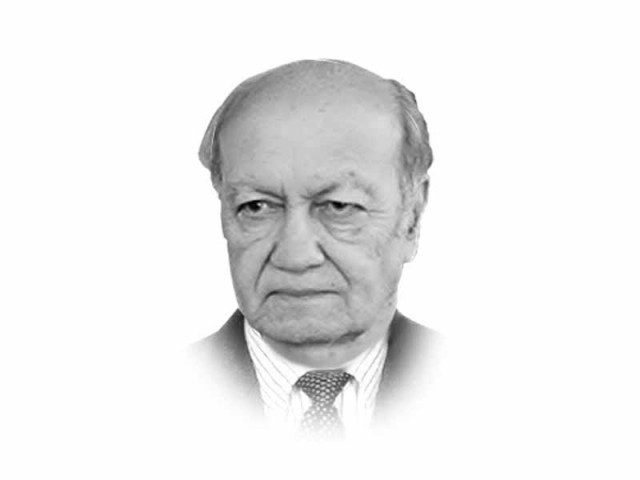PPP should engage in serious introspection
Unless people see a distinct change in leadership and strategy, there is no way PPP can revive its fortunes

The writer is a retired lieutenant general of the Pakistan Army and a former federal secretary. He has also served as chairman of the Pakistan Ordnance Factories Board
The PPP has been in a free-fall ever since the murder of Benazir Bhutto. As an interim arrangement, Mr Zardari assuming the party leadership was comprehensible. The party was traumatised and could not afford a split on the choice of a leader. But that phase is long over, especially after the electoral debacle of the 2013 national elections. An organisational overhaul and reform within the party should have taken place and a younger and more vibrant leadership both at the national level and in the provinces should have taken over. The PPP, fortunately, still has people of calibre, like Khurshid Shah, Aitzaz Ahsan, Qamar Zaman Kaira, Sherry Rehman and others, who, if entrusted with appropriate responsibility with a team of young leaders, can turn the party around. Meanwhile, Bilawal Bhutto Zardari can earn a place in the party, compatible with his talent and political standing. Unless people see a distinct change in leadership and strategy, there is no way it can revive its fortunes. It would keep shrinking and even lose its diehard support in the political heartland of rural Sindh. As long as family and feudal interests prevail and policy decisions are not rooted in the interests of the people, the PPP’s future will remain bleak. People are now far more aware of their rights and support cannot be taken for granted. The PPP stands at the most critical moment since its inception in 1967 and it is for the leadership to foster trust among the people to remain relevant in the future.
Ironically, Mr Zardari chose to challenge the military’s actions when his moral standing and performance rating is abysmally low. In sharp contrast, Zulfikar Ali Bhutto challenged the authoritarian rule of Ayub Khan when he commanded a huge following and had a dedicated and able team of politicians with him. He also knew the pulse of the people and was in sync with them.
The PPP’s performance in Sindh and its role as an opposition party in parliament are the criteria on which people are judging the party. It can regain political space lost to the military and also to other political forces only by significant improvement in its governance of Karachi and Sindh. Banking on empty slogans and drawing strength from Bhuttoism is not going to work any more, except maybe in a few isolated pockets in Sindh.
The perception that the army’s focus in Karachi is shifting from terrorism to fighting corruption would be erroneous. There is a symbiotic relationship between the two and dealing with both simultaneously should contribute in significantly improving the law and order situation and reducing corruption. Terrorist organisations, apart from indulging in direct hostage-taking, looting banks and drug trafficking, benefit from the corrupt and poor performance of government institutions. It is easy to smuggle weapons and drugs when custom authorities are amenable to corruption. In Pakistan, terrorists have got away from facing justice due to a lax and corrupt judicial system.
The role of the bureaucracy in fighting corruption is equally critical. We hardly find the state protecting bureaucrats who stand up against corrupt practices of politicians in power. Regrettably, there have been instances when those who refused to be a party to corruption were sidelined. There is a need for giving legal or constitutional cover to bureaucrats against such coercive tactics.
True, the two major political parties, the PPP and the MQM, have serious problems of leadership, allegedly maintain militant wings and indulge in corruption, and above all, are weak on governance. The allegations of mega corruption in the building authority, fisheries and other government departments are clearly a cause of great concern. The style and quality of governance that the PPP is providing will certainly end in disaster if not corrected soon. On the other hand, the military leadership, impatient to put things right, may feel justified in expanding its influence. What is generally overlooked is that if the Rangers, and ultimately the military, keep expanding their influence in Karachi and Sindh, it will further weaken political parties and their ability to govern. Besides, it would be a mistake for the military to believe it could singlehandedly set things right. Even if the Apex Committee’s decision allows it to expand its area of authority, that does not mean it will necessarily succeed. It has tried this before, not once but many times, with no lasting impact apart from a one-time cleansing operation and then it was business as usual again. There are also lessons that the military can draw from its past involvement in governance. Whenever it replaced civilian authority arbitrarily to redress ills of corruption and maladministration, after a certain period, it fell victim to the same ills that it was supposed to correct. This should be expected, as corruption or vice are not the monopoly of any particular segment of society. It is for this reason that the present operation by the Rangers should be a short-term measure aimed at dealing with certain powerful forces that are involved in white-collar crime. Meanwhile, serious effort should be made to improve governance, strengthen the National Accountability Bureau, the Public Accounts Committee and our judicial system at the national and provincial levels. No country can overcome its enormous challenges by relying on one institution alone.
Published in The Express Tribune, June 24th, 2015.
Like Opinion & Editorial on Facebook, follow @ETOpEd on Twitter to receive all updates on all our daily pieces.















COMMENTS
Comments are moderated and generally will be posted if they are on-topic and not abusive.
For more information, please see our Comments FAQ